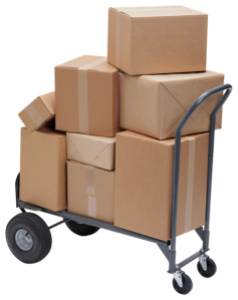In one room of my house there are three piles of assorted objects: things to take, things to sell and things to give away. I go through closets and shelves sorting my belongings according to the use of the last year. Letting go of that lesson plan I rocked several years ago may seem obvious, but it holds memories of the students and the school that won’t come back. I reluctantly throw it in the garbage. In seven weeks, a crew of workers will remove all our belongings from the house to ship them across the country to my new home. Although it has become an established routine to relocate at an average of once every six years, moving is disruptive enough to threaten my psyche.
I am apprehensive because this upcoming move implies radical changes, from semi rural to densely populate urban, from ultra conservative to a liberal environment, from a couple with children to empty nesters. Past experiences tell me that I have successfully adjusted to radical changes before, when I went from tropical to northern climate, or from a liberal to an ultra conservative environment.
A more profound shift worries me. The chaos of the few months before and after a move makes my mind spin as I struggle to stay grounded. I hold my breath as the safety of an established routine disappears under my feet. Structure holds me together, but it’s the first thing to crumble when a house fills with cardboard boxes. When structure breaks, my emotions spill out and the stress starts to show: easy tears, lost objects, skipped meals. I take my medication before bedtime, and reassure myself that soon things will go back to normal.
The most painful thing is to let go of the people and places I’ve come to love. I learned that some people stay with us for a lifetime while others participate in just a brief common event. The few friends that hold in the distance are the pieces of my heart scattered around in the places I’ve lived. Together with the trees in every garden I’ve planted, they remind me that I left something meaningful behind, the moments we shared, the tears we saved, or a habitat for birds. Then I remind myself that the first move was the most painful, when we left our homeland, families, and childhood memories behind.
Moving is thrilling and stressful, but I start to pack and label the boxes looking forward to the new changes, focusing on the adjusting. I keep stress under control by understanding its brevity and comparing it to past experiences. The most painful thing is to let go of friends, but I am already planning my next garden, the flowers I will plant to surprise my neighbors and make new friends.
En una habitación de mi casa hay tres montones de objetos varios: cosas para llevar, cosas para vender, y cosas para regalar. Paso por mis closets y estantes clasificando mis pertenencias de acuerdo al uso del año anterior. Dejar esa planificación tan buena de hace varios años parece obvio, pero tiene consigo los recuerdos de los estudiantes y la escuela que no volverán. Con desgano lo boto en la basura. En siete semanas, una cuadrilla de trabajadores se llevaran todas nuestras cosas de la casa para enviarla al otro lado del país a nuestra nueva casa. Aunque mudarnos a un promedio de una vez cada seis años se ha convertido en una rutina establecida, mudarse es lo suficientemente perturbador como para amenazar mi mente.
Estoy aprehensiva porque está mudanza inminente implica cambios radicales, de un ambiente semi-rural a uno urbano densamente poblado; de una sociedad ultra conservador a una liberal, de ser una pareja con hijos a vivir los dos solos. Las experiencias pasadas me dicen que me he ajustado exitosamente a cambios radicales previos, cuando fui de un clima tropical a clima nórdico, o cuando fui de una sociedad liberal a una ultra conservadora.
Me preocupa una tecla más profunda. El caos de los pocos meses antes y después de una mudanza hace que mi mente gire rápidamente mientras hago esfuerzos por mantenerme ecuánime. Respiro profundo al mismo tiempo que la seguridad de una rutina establecida desaparece bajo mis pies. La estructura me mantiene entera, pero es lo primero que se derrumba cuando una casa se llena de cajas de cartón. Cuando la estructura se rompe, mis emociones se derraman, y es estrés se hace evidente: lloro fácilmente, se me pierden las cosas, se me olvida comer. Me tomo mi medicina antes de dormir, y me aseguro a mi misma que pronto las cosas volverán a la normalidad.
Lo más doloroso es dejar ir a la gente y los lugares que hemos logrado amar. He aprendido que algunas personas se quedan con uno para toda la vida, mientras otros participan en sólo unos breves eventos comunes. Los pocos amigos que se mantienen en la distancia son los pedacitos de mi alma que he dejado regado en los lugares donde he vivido. Junto con los árboles en los jardines que he plantado, ellos me recuerdan que he dejado atrás algo significativo, los momentos compartidos, las lágrimas no derramadas, el hábitat para los pájaros. Entonces me recuerdo a mi misma que la primera mudanza fue la más difícil, cuando dejamos nuestra patria, nuestras familias, y los recuerdos de la infancia.
Mudarse es a la vez emocionante y estresante, pero comienzo a empacar y a marcar las cajas con miras a los nuevos cambios, enfocándome en el ajuste. Mantengo el estrés bajo control entendiendo su brevedad y comparando con experiencias pasadas. Lo más doloroso es dejar a los amigos, pero ya estoy planeando mi nuevo jardín, las flores que sembraré para sorprender a mis vecinos y hacer nuevos amigos.









“Then I remind myself that the first move was the most painful, when we left our homeland, families, and childhood memories behind.” This is so very true. I really loved this and helped me try to have a more positive outlook on situations like the ones you described. It’s definitely a work in progress for me. Keep writing!
Dejar atrás parece tan sencillo, pero es tan difícil, cuando lo único que nos queda de un lugar es el recuerdito barato que guardamos con tanto cuidado. Siempre quedan los recuerdos, eso es lo verdaderamente valioso.